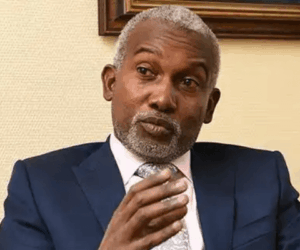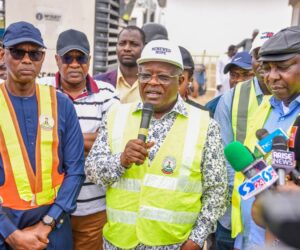1
…Moves To Crash Food Prices
ABUJA – The Federal Government on Wednesday declared that the performance of the 2024 budget has reached about 80 percent, with critical projects still underway across the country.
The Minister of Finance and Coordinating Minister of the Economy, Wale Edun, disclosed this during an engagement with the House of Representatives Committee on Appropriation chaired by Hon. Abubakar Bichi.
Edun, who appeared alongside the Minister of Budget and Economic Planning, Senator Atiku Bagudu; the Director-General of the Budget Office, Tanimu Yakubu, and the Accountant-General of the Federation, Shamsedeen Ogunjimi, said the implementation of the 2024 budget was extended by the National Assembly until December, hence, execution remains a work in progress.
Edun, in his remarks, revealed that as of September 2025, approximately 80 percent of the 2024 budget had already been executed.
“Implementation overall is at about 80 percent. The National Assembly extended the 2024 budget until December, so it is still active. We also assessed the 2025 budget with emphasis on grassroots initiatives and critical infrastructure like roads, irrigation, and other projects that directly impact citizens,” Edun said.
He further explained: “We reviewed 2024 budget performance, it’s roughly 80 percent so far, and since it was extended to December, work is still ongoing. Similarly, we examined the 2025 fiscal plan to ensure that grassroots-oriented projects, particularly those involving infrastructure and support facilities, get the priority they deserve. Discussions centered on ensuring faithful and full budget implementation.”
On the issue of additional expenditure, Edun clarified that there were no talks about a supplementary budget for 2025.
Minister of Budget and National Planning, Senator Atiku Bagudu, added that the committee acknowledged the progress made under President Bola Tinubu’s government.
He pointed out that lawmakers were particularly appreciative of the administration’s regard for the National Assembly and the cordial relations between the executive and legislative arms.
“The National Assembly has supported all key reform policies of this government, including the ongoing tax reforms, which are already producing results. Our engagement today provided an opportunity to highlight areas where more improvement is needed,” Bagudu said.
Speaking to journalists after the closed-door meeting, the Committee Chairman, Rep. Abubakar Bichi (APC–Kano), said Nigerians are increasingly anxious about how far the current budget has been implemented.
Bichi explained that the interaction was part of the legislature’s oversight responsibility to ensure proper monitoring of budget performance and improved service delivery to citizens.
“We met with the Finance and Budget Ministers, and they acknowledged the issues raised. They assured us of their determination to intensify efforts so that Nigerians begin to feel tangible benefits from the budget.
“Our members are deeply concerned, but the ministers pledged that by year’s end, Nigerians will see significant progress. They have made that commitment, and we will be tracking it closely,” Bichi stated.
FG Moves To Crash Food Prices
Meanwhile, the Minister of State for Agriculture and Food Security, Senator Aliyu Sabi Abdullahi, has disclosed that the Federal Government has moved to reduce food prices by ensuring safer routes for agricultural products across the country.
He said to achieve this, President Bola Tinubu has asked a committee within the Federal Executive Council to put measures in place.
Senator Abdullahi made the disclosure on Wednesday in Abuja during his presentation at the one day capacity-building workshop for journalists covering the Senate.
He further explained that the marching order on further crash of food prices and safe passage of agricultural commodities in the country will help the government realise its vision on food sovereignty.
He said: “In addressing the high price of transportation of farm produce in the country, I can say it on good authority to you that the president has given a marching order with a Federal Executive Council committee already handling it, on how we are going to promote safe passage of agricultural foods and commodities across our various routes in the country.
“We are aware, and I’m sure as the media, you are also aware, there are routes through which commodities are taken before they are delivered. If you know the amount of money that is being spent, you can now understand why those commodities have to be expensive at the point of delivery.
“So we are working very hard. We are doing quite a lot. But I’ve just given you a snippet because I’m here, and I felt we should look at that.”
On the vision of food sovereignty, Senator Abdullahi said the vision is within the ambit of food security and food sufficiency encompassing availability of the food, accessibility of the food, affordability, and in the right nutritional content on a sustainable basis.
He added that other programmes like the Farmer Soil Health Scheme and Cooperative reform are being mapped out for implementation.
“We are having what you call the Farmer Soil Health Scheme. And that is ready for launch. We are just waiting for the date.
“Another important part I would like you to take notice of very seriously is we are promoting, or we are having what you call, we need more cooperative reform and revamped programmes.
“Mr. President has shown tremendous interest in the cooperative sector as a veritable tool for resource mobilisation, for economic activity generation, and to improve the livelihood of members.
“And you know the principle of cooperation is clear, is democratic, yet it is also very productive. And so we are reforming this. There’s a number of things we are doing there. And I will urge you, as a press corps, to consider forming a cooperative”, he said.
Other speakers at the workshop themed with the theme, ‘Parliamentary Reporting: Issues, Challenges and Responsibilities,’ were the Chairman, Senate Committee on Media and Public Affairs, Senator Yemi Adaramodu; Senator Ita Solomon Enang, and the Director General of the National Institute for Legislative and Democratic Studies (NILDS), Professor Abubakar Sulaiman.








